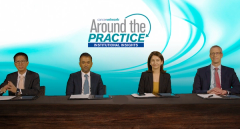
CAR-T Therapies Therapy in RRMM
A brief review of the use of CAR T-cell therapy in patients with relapsed/refractory multiple myeloma.
Episodes in this series

Transcript:
Noopur Raje, MD: It’s the late relapse that is the challenge, and you mentioned the word penta-exposed and triple refractory, so what does that mean? It means you’ve [had] all the drugs available, the approved drugs, the CD38, the 2 IMiDS [immunomodulatory imide drugs], 2 proteasome inhibitors, and you relapse post that. Most patients are refractory to whatever they have been on and they’re usually on triplets, so they are refractory to that last set of combinations, making them triple refractory. We have talked in the earlier segments about quadruplets, and we know that if we are going to be using quadruplets and if we are continuously using them, they are going to be the same penta-exposed and triplet refractory at first and second relapse. We are not going to have to wait for relapse number 5 or 6, which is where these new approaches come into play, and we have had some exciting data. We have a new novel target called BCMA, B-cell maturation antigen, and we’re all excited about the immune therapeutic approaches targeting BCMA. You’ve mentioned 1 bispecific T-cell engages, we are going to talk a little bit about that, but before we do that, we have 2 CAR [chimeric antigen receptor] T-cell products approved in the same space. We have ide-cel [idecabtagene vicleucel] and cilta-cel [ciltacabtagene autoleucel]. Omar, you do a lot of cell therapy work at Dana-Faber [Cancer Institute]; we do it at [Massachusetts General Hospital], as well. Can you give us a high level overview on the KARMA data set?...
Omar Nadeem, MD: We now have 2 CAR T-cell approved products as you mentioned. One was approved in March 2021, and now we have cilta-cel approved as of February 2022. The ide-cel product was approved based on the KARMA studies, which had patients who were heavily pretreated, exactly the patient population that you were describing and had very impressive results . The response rate was over 70%, complete response rate was over 30%, and these patients on average had medium progression-free survival [PFS], almost 9 months. If you look at the higher dose cohorts, that’s closer to a year and for patients who have had a complete response, it’s close to 1.5 to 2 years, so you clearly see some impressive results based on [those study results] leading to the approval. We have second product approved in cilta-cel, and that’s based on [results of] the CARTITUDE trials [with] approximately 100 patients. Having impressive results close to a 100% response rate and complete response rates over 80%, so far this seems to be a lot of deeper, and that’s translating into medium PFS that is approaching close to 2 years. This has led to the approval of the cilta-cel product. In practice we have had a lot of interest in these therapies and a lot of referrals for these therapies, but the availability of these therapies has been limited ever since their approval, mainly because of shortages with how these cells are made using the viral vector. Hopefully as that improves we will have more options to treat patients, but so far these have been some of the highest responses and longest PFS numbers that we have seen in this heavily pretreated patient population.
Noopur Raje, MD: You are absolutely right, it’s incredible. I would have never dreamed that we would be seeing such deep responses in such heavily pretreated patients….When you think about CAR T-cells, it is the most personalized and most designer-specific treatment because you are creating the drug for that patient sitting in front of you, which is part of the reason why there will be some gaps in terms of when can you produce. As you know, Omar, vein to vein time, it’s 4 to 6 weeks before you can get the slot for the CAR product. There must be a little bit of waiting time.
Transcript edited for clarity.
Newsletter
Stay up to date on recent advances in the multidisciplinary approach to cancer.








































